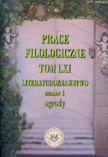Ogród Wallenroda i tajemnica Wajdeloty
Wallenrod’s Garden and the Mystery of Wajdelota
Author(s): Jerzy FiećkoSubject(s): Literary Texts
Published by: Wydział Polonistyki Uniwersytetu Warszawskiego
Keywords: ogród; motyw; Mickiewicz; Konrad Wallenrod; garden; motif; Mickiewicz; Konrad Wallenrod
Summary/Abstract: In his article {Wallenrod’s Garden and the Mystery of Wajdelota} the author analyses the role of the motif of garden in Adam Mickiewicz’s epic poem {Konrad Wallenrod}. The conventionality of the use of the term ‘garden’ is emphasized by pointing to the fact that there were some changes introduced to the order of the valley near the Neman River, which were conducive to his amorous meetings with his Ladylove. The manner in which the picture of ‘the garden’ is outlined in the poem is confronted by the author with the classical and romantic gardening styles. It is stressed that the poet distances himself from the two schools, which results from, among other things, the emphasis on the beauty of the valley, a garden created by Nature herself. The motif of the garden played an important role in Konrad’s last conversation with Aldona, when the main hero of the poem tried in vain to persuade his wife to escape to Lithuania. He tempted her with a mirage of regained happiness, appealed to their mutual memories, in which this old and still existing garden, a witness of their love, occupied the central place. While analyzing the strategy of insistence used by Wallenrod in this situation, the author of the article referred to the conception of memory proposed by a German researcher, Jan Assmann. In the last part of the essay the character of the relationship between Wallenrod and Halban is considered along with the attempt to unravel the mystery hidden in the words “my son!”, which the old Lithuanian bard, the patron of Konrad’s spy mission, used in their last conversation.
Journal: Prace Filologiczne. Literaturoznawstwo [PFLIT]
- Issue Year: 2011
- Issue No: 1 (4)
- Page Range: 219-232
- Page Count: 14
- Language: Polish

